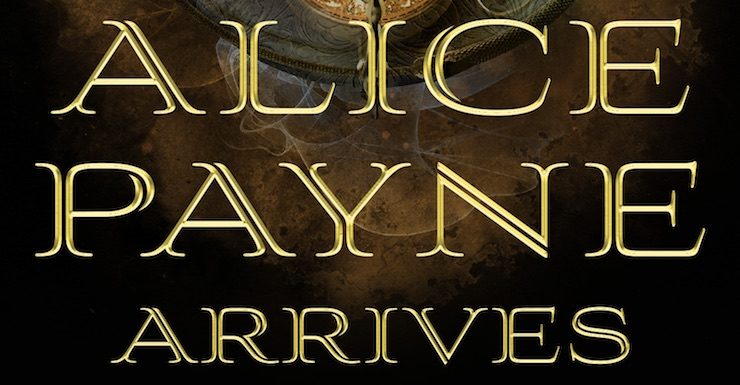Kate Heartfield is a versatile and interesting writer. Her debut novel, Armed in Her Fashion, a unique and vivid fantasy set in medieval Europe, came out just this year. Now we have Alice Payne Arrives, out of Tor.com Publishing’s novella line, a tale of highwaywomen, time travel, and trying to save the future. For certain values of save, at least.
One of the more enjoyable (but occasionally annoying) things about the Tor.com Publishing novellas is how many of them are intended as part of a series, as one part of a greater whole. Heartfield’s Alice Payne Arrives joins the likes of Nnedi Okorafor’s Binti, Spencer Ellsworth’s Starfire: A Red Peace, and Corey J. White’s Killing Gravity as the opening shot in what’s clearly a multi-part arc. That’s to say, Alice Payne Arrives is a delightful opening instalment, but it ends on cliffhangers—emotional or otherwise—for both of its main characters. I’m about equal parts happy and frustrated by this: on the one hand, more story! On the other hand, part of me feels like yelling Tell me what happens next NOW!
The titular Alice Payne is a highwaywoman—and unconventional gentlewoman—in 1788, holding up travellers in order to pay her father’s debts and keep her ancestral pile, Fleance Hall, over her head. Alice is, not incidentally, a bisexual woman of colour, and her lover, scientist and inventor Jane Hodgson, is her accomplice in highway robbery and concealing her identity.
Major Prudence Zuniga is the novel’s other protagonist. Prudence is an agent for one side of a time-travelling war—sides who refer to themselves as “Farmers” and “Guides”—and is trying to fix history. To save the future. As much as possible, anyway. But Prudence has lost faith in her side’s leadership. She thinks that maybe, maybe, rendering time travel impossible might be better than fighting a war across time that seems to break more than it fixes. For that, she needs someone from a very specific moment in history. She needs someone from 1788.
Contains slight spoilers.
I’m not normally a fan of time travel stories. The existence of paradox—and most time travel stories’ approach to paradox—tends to annoy me deeply on a narrative level. Heartfield’s approach, though, takes advantage of time travel’s contradictions: they’re essential, even integral to her narrative and to her characters, with the result that paradox itself is part of the narrative puzzle. The reader—or at least this reader—becomes engaged in trying to figure out which contradictions are going to work for the characters, and which against.
All fascinating questions of time travel and worldbuilding aside, Alice Payne Arrives’ characters are what give it life. Heartfield draws them with a deft and elegant hand: Alice and Prudence are both determined, both impulsive, both convinced that they know what ought to be done without consulting anyone around them—a trait that works well for a secret agent who has to measure how her every choice and utterance could change the course of time, and less well when the person you’re not consulting is your lover when you’re about to do something unnecessary and possibly terribly risky out of curiosity. Although they come from entirely different contexts, they’re sufficiently alike that when Alice and Prudence finally come face-to-face, and when time-travelling naïf Alice asks Prudence if Prudence is her mother (a question at which childless Prudence scoffs), the reader has to wonder if they’re (or will be) in fact related.
Jane Hodgson rests more in the background, only coming to the fore—and having a striking role to play—as the novella comes to its conclusion, but Heartfield doesn’t scant her, and her presence and unwillingness to be a silent, sidelined foil to Alice’s exploits brings other aspects of the narrative into high relief.
Alice Payne Arrives is an elegantly-written novella, precise and deft in its effects. Heartfield writes a fast and gripping story, mounting to a tense cliffhanger. But Heartfield also writes a story that’s tremendously fun, filled with humane, believable characters. I enjoyed it a hell of a lot, and I’m really, really looking forward to where Heartfield goes from here.
Or to when, for that matter.
Alice Payne Arrives is available from Tor.com Publishing.
Read an excerpt here.
Liz Bourke is a cranky queer person who reads books. She holds a Ph.D in Classics from Trinity College, Dublin. Her first book, Sleeping With Monsters, a collection of reviews and criticism, was published in 2017 by Aqueduct Press. It was a finalist for the 2018 Locus Awards and was nominated for a 2018 Hugo Award in Best Related Work. Find her at her blog, where she’s been known to talk about even more books thanks to her Patreon supporters. Or find her at her Twitter. She supports the work of the Irish Refugee Council, the Transgender Equality Network Ireland, and the Abortion Rights Campaign.










